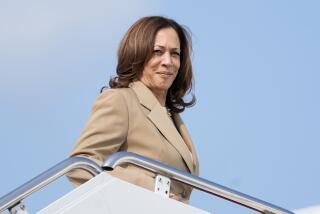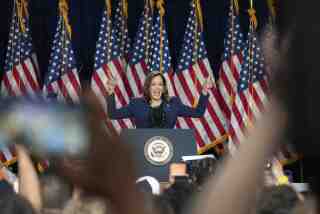Kerrey’s Offensive a High-Stakes Gamble : Democrats: The Nebraskan moves to capitalize on his South Dakota triumph. Clinton’s camp vows to ‘respond forcefully’ to attacks.
- Share via
WASHINGTON — Now, at last, it could be Bob Kerrey’s turn. In the wake of his big victory in South Dakota, the Nebraska senator sees the chance to transform the Democratic presidential campaign by thrusting himself to its forefront.
And so Kerrey has rolled the dice. Invading Bill Clinton’s native Dixie, on Wednesday he boldly challenged the Arkansas governor’s candidacy by zeroing in on what critics regard as the one-time Democratic front-runner’s most serious vulnerability--doubts about his character.
In Atlanta, Kerrey--who earned the Medal of Honor in the Vietnam War--focused on questions that have arisen about Clinton’s draft status during that conflict. Kerrey said that Clinton, in denying that he sought to avoid the draft and blaming others for creating controversy, demonstrated a pattern of evading responsibility. That, in turn, raises questions about Clinton’s electability, he said.
Kerrey’s aides said he was impelled to this dramatic assault by a deep sense of conviction. “I know he feels very strongly about this,” said his media adviser, Robert Shrum.
Clinton aides characterized Kerrey’s attack as an act of political desperation. They noted the state of Kerrey’s treasury--his campaign has no money left for television ads--as well as his reluctance to raise the issue earlier.
No matter Kerrey’s motive, it was surely a high-stakes gamble in which no one could predict which man would suffer most.
Clinton will once again have to defend the arrangements that allowed him to avoid serving in Vietnam, this time in Georgia, a state with a strong military tradition and one his campaign sees as a “must” for him to win.
Georgia and six other states have Democratic primaries or caucuses next Tuesday.
As for Kerrey, he will face retaliation from the Clinton campaign. “We will respond forcefully,” Stan Greenberg, Clinton’s pollster, warned.
Clinton himself accused Kerrey of copying “the disgraceful divide-and-conquer tactics for which George Bush became infamous in 1988.”
Clinton--who remains the best financed candidate--went ahead with plans to use this edge by stepping up his campaign in Colorado, which, along with Georgia and Maryland, will hold its primary Tuesday. Caucuses are slated in Idaho, Minnesota, Utah, Washington and American Samoa.
The increased emphasis on Colorado represented an adjustment in Clinton’s strategy resulting from Kerrey’s triumph in South Dakota.
Clinton’s advisers initially believed that after former Massachusetts Sen. Paul E. Tsongas won the Feb. 18 New Hampshire primary, he would be Clinton’s chief rival.
Since Tsongas failed to score a convincing victory in Sunday’s Maine caucuses and then came in a distant fourth in South Dakota--behind Kerrey, Iowa Sen. Tom Harkin and Clinton--the Arkansas governor’s strategists decided to pay more attention to Colorado. The Rocky Mountain state, they believe, is one Kerrey must win to buttress his claim of being the candidate of the West.
Colorado “is a place to stop Kerrey,” said George Stephanopoulos, Clinton’s deputy campaign manager.
The decision, in part, reflected confidence within the Clinton camp that his support remains firm in his Southern base. They also believe Kerrey’s financial weakness will make it difficult for him to mount full-scale campaigns in both Colorado and Georgia.
As for Tsongas, his organization seemed in need of regrouping after the flop in South Dakota.
His campaign aides Wednesday privately blamed the poor showing there on his failure to hit back after Kerrey and Clinton attacked him as unfamiliar with agriculture.
They also are urging him to put more emphasis on the positive side of his economic message, instead of just stressing the pain it may cause. “It’s one thing to favor a gasoline tax,”’ one aide said, referring to a key tenet of Tsongas’ economic plan, “but you need to tell people why.”
They continued to profess confidence that the message of economic revival, which served him well in New Hampshire, could also work in the South, especially in terms of winning votes from blacks, who are such a big portion of the Democratic electorate in that region. “The idea is to convince blacks they have a stake in economic revival,” said one adviser.
Polls also have shown him having notable strength in Colorado, and in recognition of that he campaigned there Wednesday night.
The key state for Tsongas, the one in which he can least afford to do poorly, is Maryland. “All eyes are on Maryland,” said Peggy Connolly, campaign press secretary.
Harkin, who lost the test of Midwest supremacy to Kerrey in South Dakota, was grimly hanging on. Short of funds, he planned to concentrate on the caucuses in Minnesota, Washington and Idaho, along with the primary in Maryland.
“We’re happy to let Kerrey cut up Clinton while we hunt for votes,” said Don Sweitzer, senior adviser to the Harkin campaign.
The Harkin campaign was forced to engage in damage control Wednesday because of a story published in the Atlanta Constitution about a radio commercial that was never broadcast. The ad attacked Clinton’s support of capital punishment, accusing him of using a “black man’s death to boost his campaign,” referring to Clinton’s leaving the campaign last month to preside over an execution.
Lorraine Voles, Harkin’s press secretary, said that “an overzealous campaign aide,” Kevin Gray, the campaign’s Southern coordinator, had the ad produced without approval from senior campaign officials and had played it for a Constitution reporter.
She said that Tim Raftis, Harkin’s campaign manager, had reprimanded Gray.
Times staff writers Cathleen Decker, David Lauter and Dave Lesher contributed to this story.
March 3: Candidate’s Next Test
The votes next Tuesday are shaping up as important precursors to the Super Tuesday primaries on March 10. Next week, 380 Democratic convention delegates will be at stake in seven states, and 131 Republican delegates in three states.
Washington (caucus): This state’s Democratic caucus draws more voters--and elects more delegates--than those in the mountain states and has attracted more focus from contenders. Tsongas hopes to demonstrate national viability. Delegates: (Democrats only): 71.
Utah (primary): This first-time Democratic primary in this heavily Republican state has attracted no effort from candidates; Tsongas, Clinton, Harkin have stirred most interest among activists, but race is wide open. Delegates (Democrats only): 23.
Colorado (primary): This first-time primary is the marquee Western match-up; Brown, Kerry, Clinton and Tsongas all have targeted the state. Relatively low unemployment could help Bush blunt Buchanan challenge. Delegates: Dem. 47, GOP 37.
Idaho (caucus): Little candidate attention and the likelihood of a low turnout makes results unpredictable. But state often favors native Westerners such as Kerry. Delegates (Democrats only): 18.
Minnesota (caucus): Regional favorites Harkin and Kerry have devoted the most effort to wooing the liberal activists and union members who dominate caucuses; both need strong showings in the day’s richest delegate prize. Delegates (Democrats only): 78.
Maryland (primary): Affluent suburban Democratic electorate should bend toward Tsongas, but Clinton has substantial institutional support and could draw well among blacks. Bush expected to run well. Delegates: Dem. 67, GOP 42.
Georgia (primary): As the first Southern state on the ballot. Georgia is the key to Super Tuesday. Republican primary will test whether the South still stands behind Bush; Democratic contest will gauge Clinton’s strength in the region. Delegates: Dem. 76, GOP-52.
The Delegate Tally*
Here is the current breakdown of the presidential preferences of delegates to the Democratic and Republican national conventions. Democratic: Total Jerry Brown: 8 Bill Clinton: 95 Tom Harkin: 72 Bob Kerry: 22 Paul E. Tsongas: 20 Other: 5 Uncommitted: 212 Undetermined: 9 Needed to nominate: 2,144 Republican: Total Patrick Buchanan: 9 President Bush: 28 David Duke: 0 Uncommitted: 5 Needed to nominate: 1,105 * According to the Associated Press
More to Read
Get the L.A. Times Politics newsletter
Deeply reported insights into legislation, politics and policy from Sacramento, Washington and beyond. In your inbox twice per week.
You may occasionally receive promotional content from the Los Angeles Times.










